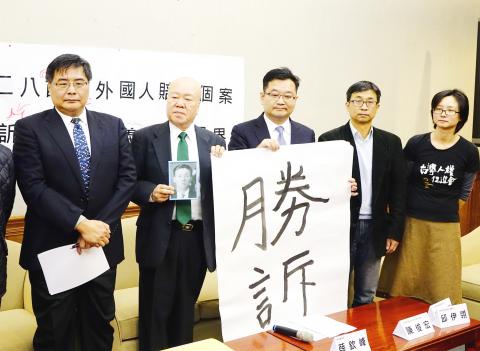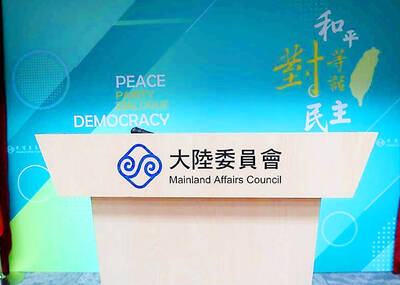Less than two weeks before the 69th anniversary of the 228 Incident, the Taipei High Administrative Court yesterday ruled in favor of Keisho Aoyama, the son of a Japanese victim of the massacre, in his compensation request.
The court ruled that he is eligible for NT$6 million (US$190,077) in compensation for his father’s death.
If the 228 Memorial Foundation and the Ministry of the Interior decide not to appeal, the ruling would make Aoyama the first foreigner to be compensated for the 228 Incident, the Taiwan Association for Human Rights (TAHR) said.

Photo: Wang Yi-sung, Taipei Times
Aoyama, from Okinawa, Japan, filed for compensation with the 228 Memorial Foundation in 2011 (officially processed in 2013) for his father, Esaki Aoyama, who was, according to various records, captured by the Chinese Nationalist Party (KMT) regime’s army in 1947 when his ship from Okinawa reached the shore of Keelung and was later reportedly murdered on Heping Island (和平島), which was at that time called Sheliao Island (社寮島).
Esaki Aoyama boarded the ship bound for Keelung for a reunion with his wife and son, who were still living in Keelung, after he returned from Vietnam as a draftee soldier.
Keisho Aoyama’s request was rejected by the foundation in 2014, despite his father being recognized as a 228 Incident victim. With the help of the TAHR and Taiwanese lawyers, he filed an administrative lawsuit with the Taipei High Administrative Court in September last year.
The court said in its press release that the Feb. 28 Incident Disposition and Compensation Act (二 二 八事件處理及賠償條例), promulgated in 1995, does not state that compensation should be restricted to Taiwanese.
Taiwan also ratified in 2009 two international human rights covenants, it said, adding that any violation of human rights should be effectively compensated with no discriminatory treatment.
Hsueh Chin-feng (薛欽峰), the lawyer representing Keisho Aoyama, lauded the decision as a “historic ruling,” saying its significance lies in having set a precedent that regardless of nationality, everyone should be equally protected by the law.
“The court stated that the 228 compensation act, a special law, has priority over the State Compensation Law (國家賠償法), a general law,” Hsueh, said referring to the ministry’s invoking of the Article 15 of the state compensation law that says the provisions of the law “shall be applicable to a foreign claimant only to the extent that the people of the Republic of China, according to a treaty, law, or custom of that person’s country, enjoy the same rights in that country.”
The ministry, the competent authority of the supposedly independent 228 Memorial Foundation, had hindered the approval of Keisho Aoyama’s compensation request by suggesting that since Japan has not compensated Taiwanese comfort women and former Taiwanese service personnel, “the principle of reciprocity” maintained in the state compensation law does not apply, TAHR said.
Keisho Aoyama, who appeared at a news conference in Taipei yesterday, said the ruling was “a groundbreaking one upholding justice and human rights,” thanking those who had offered him assistance along the way.
“While the problems of Taiwanese comfort women and Japanese soldiers still exist, the ruling is a great deed in its attempt to overcome this vicious cycle,” he said.
He called on the government and the foundation not to appeal the ruling.
TAHR executive board member Fort Liao (廖福特) echoed the call, asking the ministry “not to manufacture more excuses, especially during a period of transition of power.”
“This is belated justice. Financial compensation is not the point; what matters most is the state’s recognition of Esaki Aoyama as a victim of the state’s human rights violations,” Liao said.
“The ruling shows that the state cannot avoid its responsibility because the victim of the state’s human rights violation is a foreigner,” he said.
228 Memorial Foundation chief executive Liao Chie-ping (廖繼斌) said the foundation’s board would meet on Wednesday next week to discuss the ruling and that he hoped the conclusion would be announced before Feb. 28.

NO RECIPROCITY: Taipei has called for cross-strait group travel to resume fully, but Beijing is only allowing people from its Fujian Province to travel to Matsu, the MAC said The Mainland Affairs Council (MAC) yesterday criticized an announcement by the Chinese Ministry of Culture and Tourism that it would lift a travel ban to Taiwan only for residents of China’s Fujian Province, saying that the policy does not meet the principles of reciprocity and openness. Chinese Deputy Minister of Culture and Tourism Rao Quan (饒權) yesterday morning told a delegation of Chinese Nationalist Party (KMT) lawmakers in a meeting in Beijing that the ministry would first allow Fujian residents to visit Lienchiang County (Matsu), adding that they would be able to travel to Taiwan proper directly once express ferry

FAST RELEASE: The council lauded the developer for completing model testing in only four days and releasing a commercial version for use by academia and industry The National Science and Technology Council (NSTC) yesterday released the latest artificial intelligence (AI) language model in traditional Chinese embedded with Taiwanese cultural values. The council launched the Trustworthy AI Dialogue Engine (TAIDE) program in April last year to develop and train traditional Chinese-language models based on LLaMA, the open-source AI language model released by Meta. The program aims to tackle the information bias that is often present in international large-scale language models and take Taiwanese culture and values into consideration, it said. Llama 3-TAIDE-LX-8B-Chat-Alpha1, released yesterday, is the latest large language model in traditional Chinese. It was trained based on Meta’s Llama-3-8B

STUMPED: KMT and TPP lawmakers approved a resolution to suspend the rate hike, which the government said was unavoidable in view of rising global energy costs The Ministry of Economic Affairs yesterday said it has a mandate to raise electricity prices as planned after the legislature passed a non-binding resolution along partisan lines to freeze rates. Chinese Nationalist Party (KMT) lawmakers proposed the resolution to suspend the price hike, which passed by a 59-50 vote. The Taiwan People’s Party (TPP) voted with the KMT. Legislative Speaker Han Kuo-yu (韓國瑜) of the KMT said the resolution is a mandate for the “immediate suspension of electricity price hikes” and for the Executive Yuan to review its energy policy and propose supplementary measures. A government-organized electricity price evaluation board in March

NOVEL METHODS: The PLA has adopted new approaches and recently conducted three combat readiness drills at night which included aircraft and ships, an official said Taiwan is monitoring China’s People’s Liberation Army (PLA) exercises for changes in their size or pattern as the nation prepares for president-elect William Lai’s (賴清德) inauguration on May 20, National Security Bureau (NSB) Director-General Tsai Ming-yen (蔡明彥) said yesterday. Tsai made the comment at a meeting of the Legislative Yuan’s Foreign Affairs and National Defense Committee, in response to Democratic Progressive Party (DPP) Legislator Wang Ting-yu’s (王定宇) questions. China continues to employ a carrot-and-stick approach, in which it applies pressure with “gray zone” tactics, while attempting to entice Taiwanese with perks, Tsai said. These actions aim to help Beijing look like it has